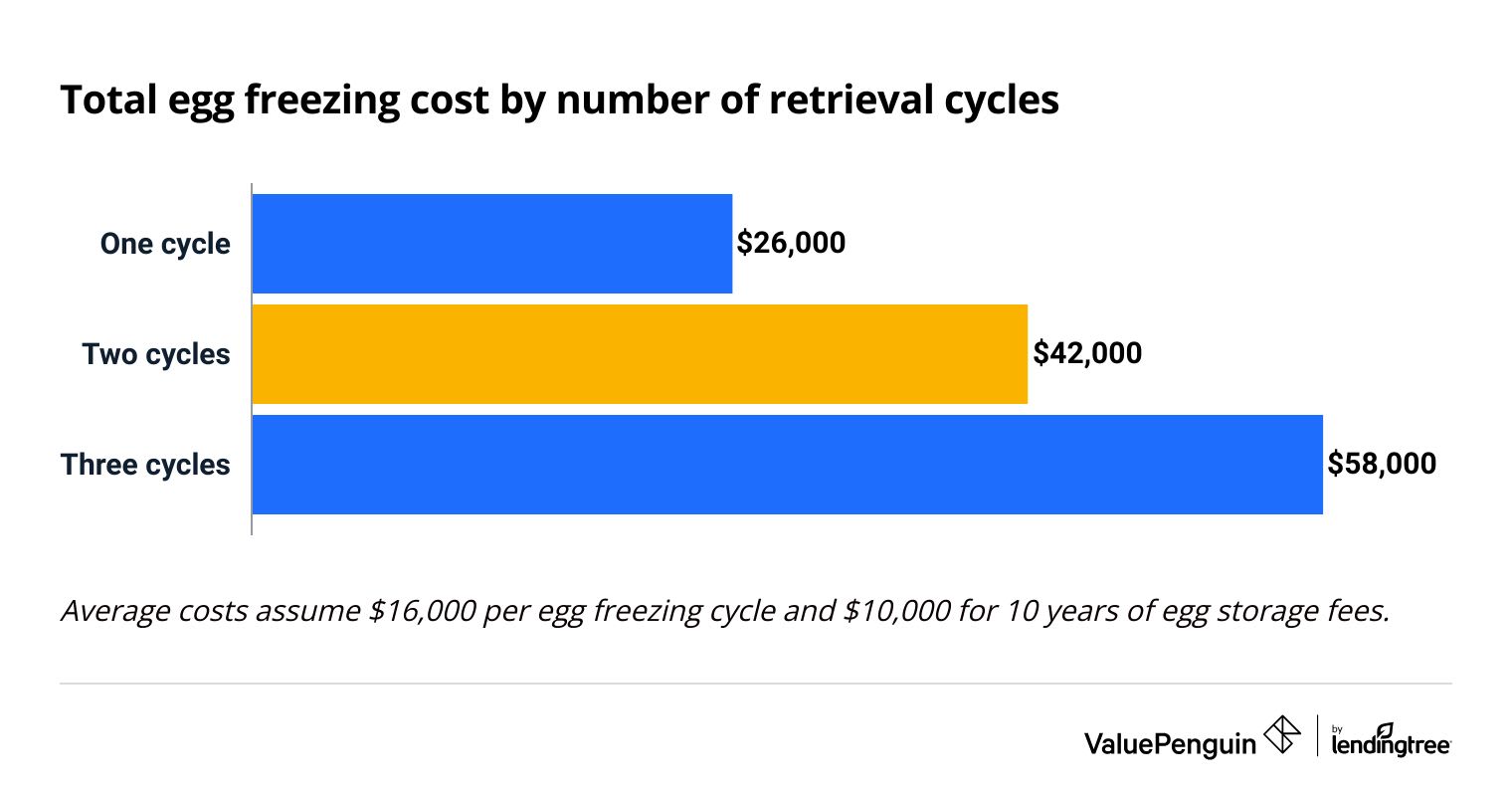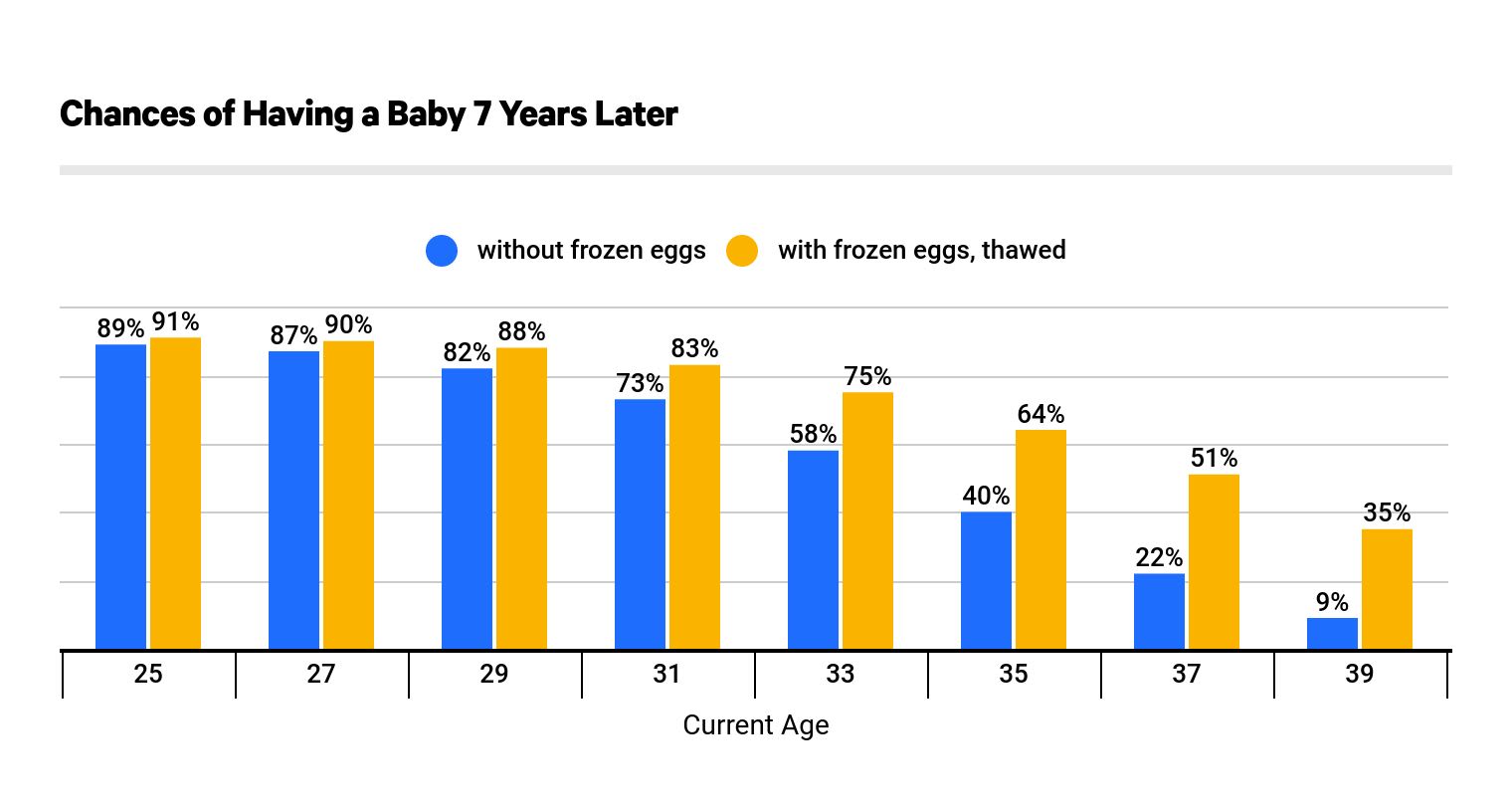How Much Does it Cost to Freeze Your Eggs?
It costs roughly $42,000 to freeze your eggs, on average.
Find Cheap Health Insurance Quotes in Your Area
That includes two cycles of egg retrieval and 10 years of storage. Keep in mind that the total cost you pay will depend on other factors like your age and health insurance plan details.
Insurance rarely pays for egg freezing unless you have cancer or other fertility problems from medical issues. However, some large companies like Apple and Google will pay for egg freezing as an employee benefit.
How much does it cost to freeze eggs?
It costs $42,000 to preserve your eggs, also called oocyte cryopreservation, on average.
That $42,000 figure includes two rounds of egg freezing and 10 years of egg storage. It costs roughly $16,000 per egg-freezing cycle on average. The egg-freezing process includes expensive medications, doctor visits and the egg retrieval process.
However, it does not pay for storing, thawing, fertilizing or implanting the embryos to get pregnant. Storing your frozen embryos costs $500 to $1,000 per year on average. Your storage costs may increase with time. Budgeting for future price hikes can help you avoid unexpected costs in the future.
Finally, it costs an extra $10,000 to use the eggs to get pregnant on average. Start saving now to avoid a large out-of-pocket cost down the road.

Keep in mind that the total cost you pay will depend on how many egg-freezing cycles you need and how long you store your eggs. For example, a woman who has a single egg-freezing cycle and five years of storage will pay $42,000 less than someone who requires three cycles and 15 years of storage.
Cost of egg freezing by number of cycles
Egg freezing cycle(s) | Total cost | |
|---|---|---|
| Low cost | One cycle | $26,000 |
| Average cost | Two cycles | $42,000 |
| High cost | Three cycles | $58,000 |
Assuming $16,000 per egg freezing cycle and $10,000 for ten years of egg storage costs.
Keep in mind that you'll have to pay other costs for medical care before birth and when you give birth.
Does insurance cover egg freezing
Most health insurance plans won't pay for egg freezing.
That's because most insurance companies consider egg freezing to be elective. However, health plans will usually cover egg freezing under certain circumstances that make it hard or impossible to have children. For example, your insurance may pay for egg freezing if you're diagnosed with cancer or another illness that causes fertility problems. Some health plans will also cover egg-freezing for transgender individuals as part of gender-affirming care.
Depending on your plan details, your health insurance may pay for part of your egg-freezing costs. For example, some plans will pay for blood tests, your first doctor visit and some prescription drugs.
Egg freezing insurance rules by state
Seven states require insurance companies to pay for egg freezing for women who have a cancer diagnosis or other "medically caused" fertility issues.
- Connecticut
- Delaware
- Illinois
- Maryland
- New York
- Rhode Island
A much larger number of states require that health insurance plans cover IVF (in vitro fertilization). IVF is another popular fertility treatment that can improve your chances of getting pregnant and is cheaper.
IVF tends to cost less than egg freezing on average. The procedure is also more commonly covered by insurance.
Other ways to pay for the cost of freezing eggs
Some egg-freezing clinics offer installment plans.
Another common way to pay for egg-freezing costs is by getting a loan. Many clinics work with lenders that specialize in loans for freezing eggs. For example, Prosper Healthcare Lending and LendingClub offer loans tailored specifically to people who want to freeze their eggs.
Some egg-freezing companies offer limited financial assistance. For example, Progyny has the LIVESTRONG Fertility Discount Program for people who have cancer, limited insurance coverage and meet certain income requirements.
If you have a high credit score, you may qualify for a personal loan through your bank.
Personal loans often have lower interest rates than credit cards. That makes them a good choice if you need to borrow money to pay to freeze your eggs.
Employer benefits
Roughly one in five large companies cover the cost of egg freezing.
In recent years, it's become more common for companies to offer egg freezing as an employee benefit. However, these benefits are still largely concentrated among big tech companies such as Apple, Meta, Google, Intel and Microsoft
Only 16% of big non-tech companies offer egg-freezing benefits to their employees. Small and medium-sized businesses, including tech companies, are even less likely to pay for the procedure.
Federal government employees have egg-freezing coverage, but only if they're at risk for cancer or another medical issue that could cause long-term fertility problems.
At what age should you freeze your eggs?
You should freeze your eggs before age 35 to have the highest chance of getting pregnant.
You can freeze your eggs in your 20s. However, you have to pay annual storage fees to preserve your eggs. That means it makes better financial sense for most women to wait until their early 30s to freeze their eggs.

Keep in mind that freezing your eggs doesn't guarantee that you'll get pregnant in the future. For example, a 39-year-old with frozen eggs only has a 35% chance of getting pregnant.
However, that's still three times better than the roughly 9% likelihood they'd have of getting pregnant naturally.
Frequently asked questions
How much does it cost to freeze your eggs?
It costs $42,000 to freeze your eggs, on average. That includes the cost of two egg retrieval cycles and 10 years of egg storage.
Does insurance cover egg freezing?
No, most health insurance plans don't cover egg freezing. Coverage is more common for people who have cancer or other medically caused fertility problems.
However, egg freezing is a common employee benefit among top tech companies like Google, Apple and Meta.
When is the best age to freeze your eggs?
Freezing your eggs in your early 30s to use in your late 30s or early 40s usually makes the most sense financially. If you freeze your eggs in your 20s, you'll pay more for unnecessary storage costs.
Methodology and sources
The likelihood of getting pregnant at different ages is based on the egg banking calculator from the University of North Carolina (UNC) Fertility Center. Egg freezing cost information came from Fertility IQ. Data regarding the number of large companies that offer egg freezing as an employee benefit came from New Hope Fertility.
The Kaiser Family Foundation (KFF) supplied information related to state-level fertility coverage laws.
Senior Writer
Talon Abernathy is a ValuePenguin Senior Writer who specializes in health insurance, Medicare and Medicaid. He's also contributed to other insurance verticals including home, renters, auto, motorcycle and flood insurance.
Talon came to ValuePenguin in 2023. Since his arrival, he's helped to expand the site's health insurance-related content offerings. He enjoys helping readers understand the ins and outs of America's all too complicated health insurance landscape.
Before coming to ValuePenguin, Talon worked as a freelance writer. His prior work has touched on a broad range of personal finance-related topics including credit-building strategies, small business incorporation tactics and creative ways to save for retirement.
Insurance tip
In many parts of the country, you can qualify for a free Silver health insurance plan if you meet certain income requirements. Government subsidies in the form of premium tax credits and cost-sharing reductions may mean you'll pay nothing for coverage.
Expertise
- Health insurance
- Medicare and Medicaid
- Flood insurance
- Homeowners insurance
- Renters insurance
- Auto and motorcycle insurance
Referenced by
- The Miami Herald
- Money.com
- MSN
- Nasdaq
- The Sacramento Bee
- Yahoo! Finance
Education
- BA, University of Washington
- Certificate in Copyediting, UC San Diego
Credentials
- Licensed Life & Disability Insurance Agent
- Licensed Property & Casualty Insurance Agent
Editorial note: The content of this article is based on the author's opinions and recommendations alone. It has not been previewed, commissioned or otherwise endorsed by any of our network partners.
